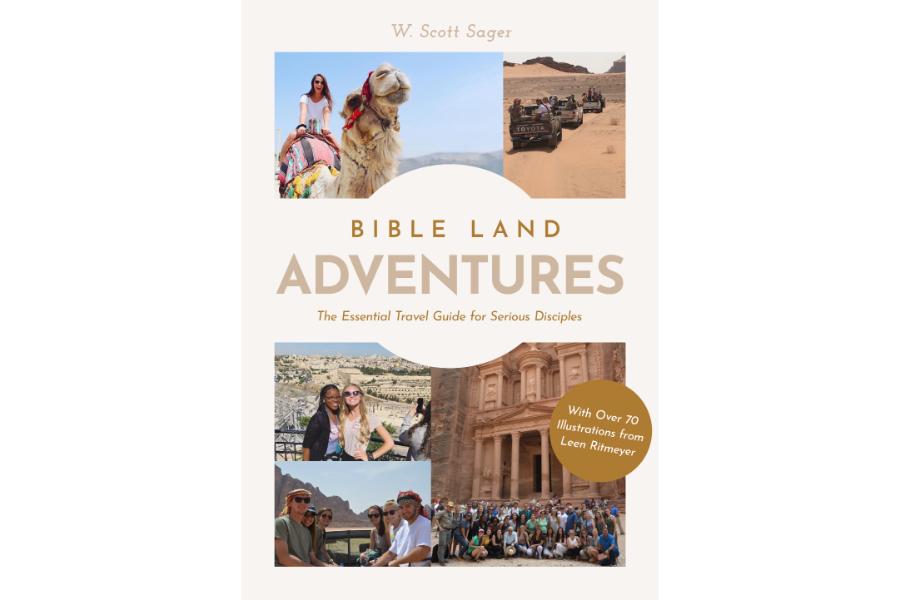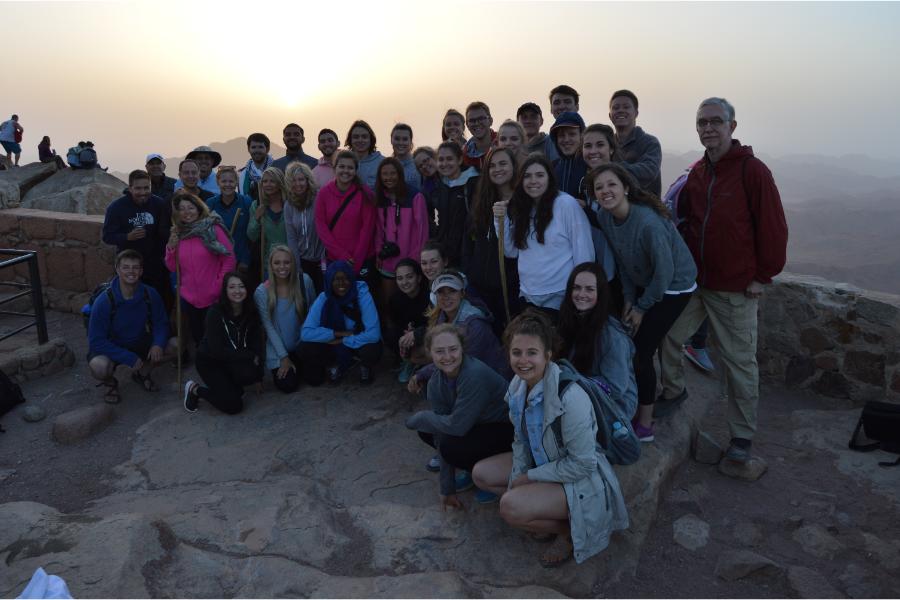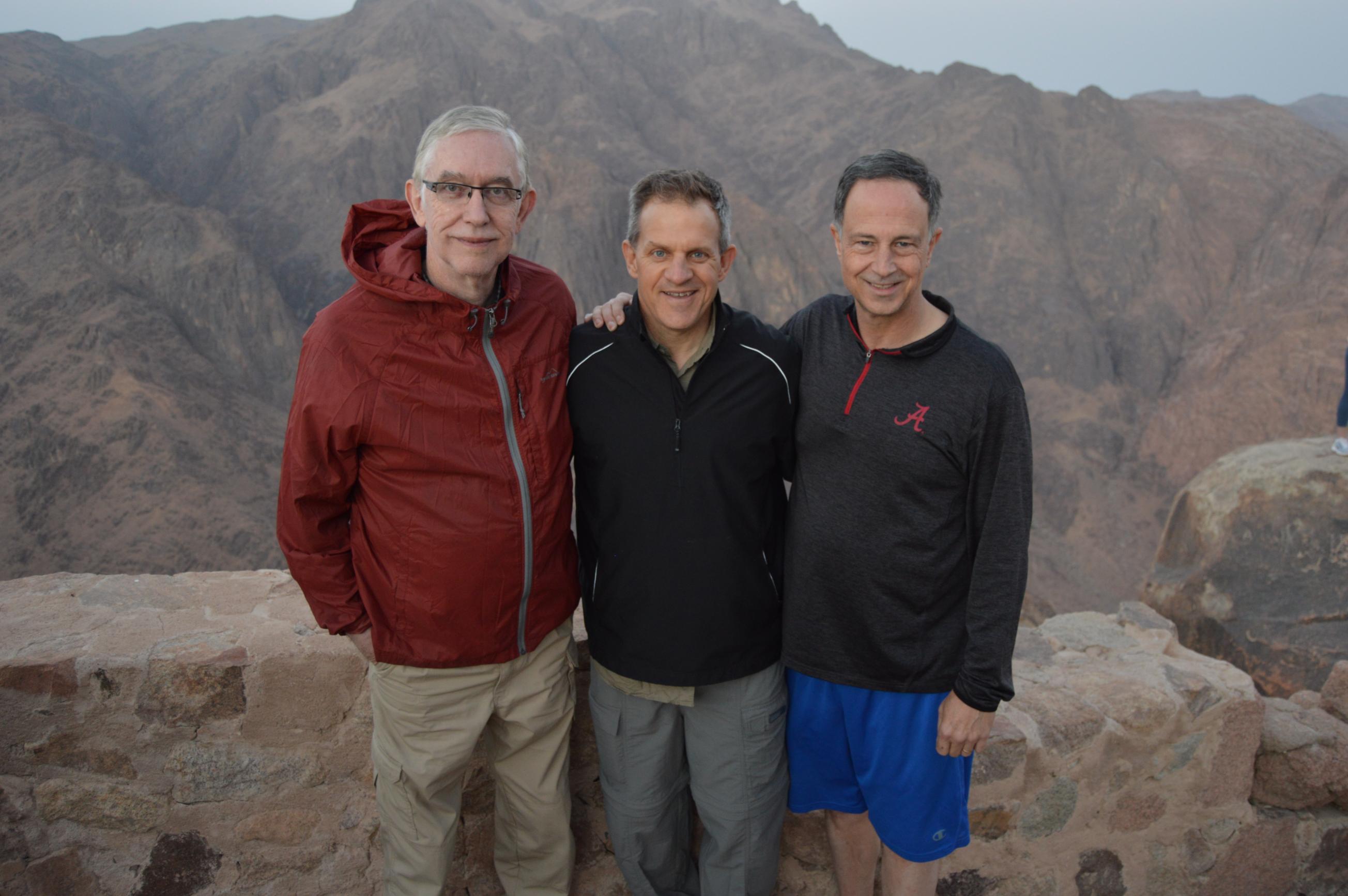Bible Land Adventures - A Conversation with Scott Sager
February 20, 2024

A new book by Scott Sager guides readers through the biblical landscape.
Seasoned travel leader and Bible professor Scott Sager designed Bible Land Adventures from his over thirty years of experience in Israel. He kindly sat down with us to talk about this new book.

In the introduction you mention that your friend, Joseph Shulam (‘69), and benefactor, Dorothy Rooker, “shaped your life and transformed your ministry” by introducing you to the land of Israel. How did that introduction happen?
Well, Joe is an interview in himself! He was kicked out of his [secular Jewish household] after he was baptized in the Mediterranean by missionaries from Nashville. After finishing high school in Georgia, he came to Lipscomb University where he met his wife, got a chemistry degree, and studied the New Testament with Harvey Floyd. Then he went back to Jerusalem and started a Jewish church for believers in Jesus. Joe has degrees in archaeology and rabbinics, and he has planted churches all around the world!
In 1987 I was a grad student at ACU. Joe started a program there and Dorothy Rooker donated money so that I could go to Israel for four months. I lived next door to the Albright Archaeological Museum, a block from the Garden Tomb and two blocks from the Sheep’s Gate. I got to get up every morning and jog around the old city, then go to classes at Hebrew University. Joe took us to Greece, Rome, Egypt and to climb Mount Sinai. It was amazing. In fact, a lot of the things that are incorporated into the trip I lead now began with my relationship with Joe back in 1987. We’ve been friends ever since.
Those two people [Shulam and Rooker] did so much to pour into me, and I am so grateful there’s a donor for our program here, Bill Biggs (‘60), who helps thirty students each year go on our Israel trip. What Dorothy Rooker did for me, Bill Biggs is doing for a whole other generation. We’ve taken 163 students plus over 20 faculty and staff on five trips so far.
And this book came directly out of those trips?
Here’s what’s interesting. I just wanted to create something that would be a resource for our students. First I thought it would just be Xeroxed sheets, then I thought it would be a spiral notebook. I went to see Chad Harrington at HIM Publishing, and he recommended I consider making it a book. That’s when it began to grow as a concept. The goal is for you to have this book when you’re in Israel. You can stand on every site, read the scriptures that go with it, refer to the maps in the back and understand how it all works together. You can also record the date and time you were there, rate the site and jot down its value to you personally.

Sunrise at Sinai
Yes, this book is very interactive with the way it is organized by region with maps (Israel, Palestine, Jordan, Sinai), illustrations, relevant verses and space for noting facts, star ratings, and dates. It’s almost like a fill-in-the-blank travel journal.
Yes it is! On Amazon, one of its labels is “travel journal.” The goal is for it to be a guide for serious disciples, but what I didn’t realize was how much people would enjoy it in Bible classes and just being able to read and look at the maps, illustrations, and my powerpoint slides. One of the things I’m looking at now is turning it into a video series because of that.
I’ve had some great friends who have helped me with the book. It’s nice to have people here and everywhere who have recommended sites and additional resources. There are lots of people who have gone to Israel who have been able to weigh in on this project and give their blessing to it.
How were you able to get all these amazing illustrations from Leen Ritmeyer, a legend in the field of archaeology?
That’s what shifted this from a solid resource to an outstanding resource– the illustrations by Leen Ritmeyer. I realize the book was written by John Doe, but the illustrations were done by Vincent van Gogh! Ritmeyer is the leading archaeologist on the Temple Mount and the leading architectural archaeologist in the world today. When you look up a site online and see an architectural sketch, it’s almost guaranteed to be one of his. I reached out to him about buying some of his images for this guide. When he found out it was a resource for students and connected with Lipscomb’s Lanier Center for Archaeology, he gave us a discount so we could buy every image we wanted. It was a huge gift! His illustrations help the sites come alive even when you’re just reading it; but, when you’re standing at a site, it’s like the lights go on. You understand what was there and what the culture must have been. That’s the goal of the class I teach, biblical worldview: how do we expand the students’ worldview by the trip, by the book, by the way we go about bringing it all together. Leen Ritmeyer is a rockstar!
What’s an example of an illustration bringing it all together?
Oh, this kind stuff just geeks me out! If you look at the illustration of the Sea of Galilee on page 216, you can see the harbors. In 1983/84 there was such a drought that archaeologists were able to go into the sea and locate where all the harbors were around the Sea of Galilee. If you watch [most modern depictions] of biblical stories, everybody just pulls their boat up on the shore, but no – they were way more sophisticated than we realized. The lights come on and you begin to understand things in a way you didn’t see them before. That’s what makes it fun for me to teach! Or look at all the illustrations of Capernaum reconstructed: you can see where the synagogue was and where Peter’s house was. And do you see the illustration of the Solomonic Gate of Gezer on the bottom of page 184? That was commissioned by Steve Ortiz [director of Lanier Center for Archaeology] because that is where he and our archaeologists have dug for the last twelve years. It’s so cool that this gives you the idea of where our archaeology school has been.

Leonard Allen, Scott Sager & Buddy Bell in Israel
The book’s appendices include a glossary of biblical terms, Jewish and Muslim holidays, helpful Hebrew and Arabic phrases, how to identify local trees and plants, recommendations for further reading, and Hebrew blessings. How did you choose those topics?
Well, the trip is not for Bible majors only. It’s for people who want to get a grasp of the biblical worldview. There are always people on the trip who want to know about the festivals or what a tamarisk tree looks like. So, the book just tries to spotlight cultural things people would appreciate.
So a lot of these items have their origin in student questions?
Yes. I led the trip four times before I did the book. I took a lifelong learning group with an advanced copy. We were able to stand on the sites and make some edits. Then I took another group of students and made some more edits. The final product you have in your hands is after it’s already had two groups who have walked with it. It’s been road tested.
I would love for ministers to get this book. It’s fascinating just to read and picture the landscape. And, of course, if you’re going to Israel, this is a resource you will want to take with you. You’re going to spend enough money on that trip that you’ll want to make sure you capture everything you can, and this book will give you the tools to do that.
Get your copy of Bible Land Adventures: The Essential Travel Guide for Serious Disciples here.
Bible and Ministry Blog